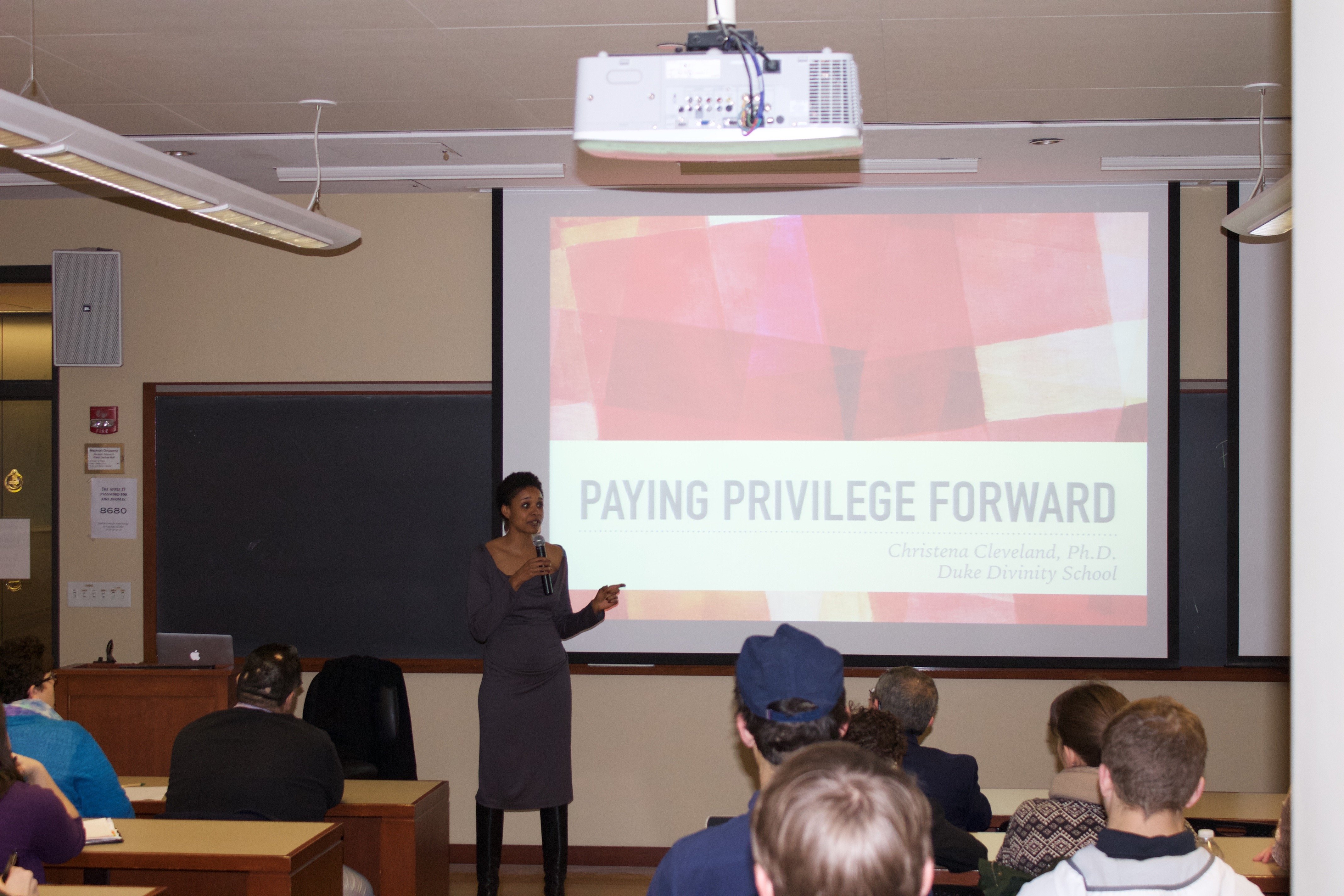

Christena Cleveland, social psychologist and associate professor of the practice of reconciliation at Duke University’s Divinity School, delivered a series of lectures at Amherst College on March 3 and 4.
Cleveland’s first lecture, “Paying Privilege Forward: How We Can Use Our Influence to Create a More Equitable Society,” took place in Paino lecture hall on March 3. On March 4, she gave a talk in the Multicultural Resource Center titled “Faith, Justice & Reconciliation.” Later that evening, she gave a third talk about the importance of diversity in American churches.
Paul Sorrentino, Director of Religious and Spiritual Life, helped organize the lectures. Cleveland’s talks were primarily sponsored by the Schwemm Fund and also by the black studies, anthropology and sociology departments.
Sorrentino said that Cleveland offers insight on establishing meaningful connections across cultural and racial barriers. “I brought Dr. Cleveland’s work to the diversity and inclusion committee last year,” Sorrentino said. “We were interested in bringing her because of her ground-breaking work on factors that cause people to feel marginalized and ways we can address those such that people feel included in meaningful ways.”
Sorrentino said that Cleveland’s talks were of particular interest to the college because she offers tangible strategies for how to break down barriers within communities.
“The college’s commitment to diversity and inclusion has been ongoing for several years,” he said. “While our demographics have reflected that commitment, developing a genuine sense of mutual commitment and community across our differences has been elusive. Cleveland stresses the need to intentionally identify with others, give sincere attention to what matters to them … and develop a non-hierarchical, mutual dependence.”
“We are members of the larger Amherst College community and want to echo the message that Christena Cleveland relayed to her audience: We are all so fortunate to be students at Amherst and it is so important to pay privilege forward because we all have the ability to do so,” Ryan Cassidy ’16, who attended the event, said.
“When it comes to racial division, tension, strife and pain, there is no single response. There is, instead, a commitment to do better, to learn, and to live together in more respectful and just ways,” chair of the black studies department John Drabinski said. “That work continues with any campus speaker on racial justice and healing. Cleveland struck us as worthy of support because she brings important, fresh thoughts to these topics.”
Cleveland began her first lecture by discussing her teenage years and the privileges that her education afforded her.
“I grew up with much support, and went to Exeter and then Dartmouth,” she said. “They keep telling you at Exeter that you’re the best and the brightest … I wanted to believe that, until it occurred to me that I essentially won a genetic lottery and am part of the 28 percent of people who grow up in this country with parents who went to college, which makes you three and half times more likely to have the tangible support that you need to go to college.”
She argued that a blind faith in individualism, meritocracy and equality ignores the effects of institutional racism. “Individualism is a false belief. We’d love to believe that as long as I work hard, that’s all I have to do — but in reality every step [some people] take, they face something that serves as an impediment against them. It’s not just about how hard you work — there are a whole of social things going on,” Cleveland said.
The talk resonated with issues discussed during Amherst Uprising. “Amherst Uprising … was painful and exhilarating and full of despair and hopeful, all at the same time,” Drabinski said. “In the wake of all of those feelings and thoughts, we need ... deep impact and productive conversations, [and] Cleveland is part of that. We need all approaches and all voices that are committed to anti-racist struggle in this moment.”
Cleveland concluded by urging students to resist the temptation to deny their privileges, and instead “lean in,” interacting and listening to those within one’s community.
“We can leave our turf right here in our communities, which means getting outside of my circle of friends and going to other people groups in my community, listening on their terms, hearing what their struggles are and believing them,” she said.